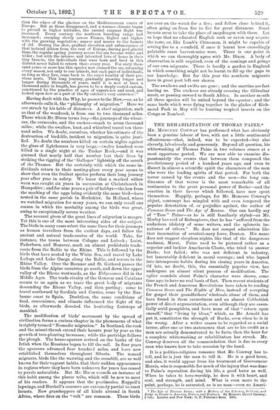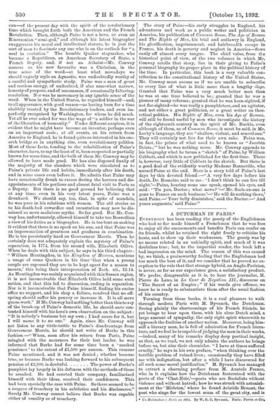THE REHABILITATION OF THOMAS PAINE.* Ma. MONCIIRE CONWAY has performed
what has obviously been a genuine labour of love, with not a little sentimental effusiveness—that, indeed, was to be expected—but also cleverly, laboriously, and generously. Beyond all question, his whitewashing of Thomas Paine in two volumes comes at a most opportune period. We are now able to examine dis- passionately the events that between them composed the revolutionary period of a hundred years ago, and even to dissect in almost a scientific spirit the characters of the men who were the leading spirits of that period. For both the terror caused by the events and the men—the long con- tinuance of that terror is the most remarkable of all testimonies to the great personal power of Burke—and the reaction in their favour which followed, have now spent themselves. Happily, perhaps, for Mr. Moncure Conway's object, contempt has mingled with and even tempered the popular detestation of, or prejudice against, the author of Common Sense and The Age of Reason. One can hardly say of " Tom " Paine—as he is still familiarly styled—as Mr. Morley has said of Robespierre, that he has " suffered from the audacious idolatry of some writers, and the splenetic im- patience of others." He does not compel admiration like that incarnation of revolutionary force, Danton. His name does not suggest sleepless nights, like that of the dangerous madman, Marat. Paine used to be pictured rather as a superior and luckier Anacharsis Clootz, who tried to answer Burke, but failed ; who was not deficient in industry, but lamentably deficient in moral courage ; and who lapsed into intemperate habits during his closing years in America.
Of late, no doubt, this, the essentially popular view, has undergone an almost silent process of modification. The uglier scandals about Paine's character were shown, some time ago, to have no real basis of fact. Then recent students of the French and American Revolutions have taken to reading Common Sense and The Rights of Man, instead of accepting for gospel their grandfathers' wholesale abuse of them, and have found in them earnestness and an almost Cobbettish power of direct argumentation, even although they are essen- tially acrid pamphlets, and have none of that " return upon oneself," that "living by ideas," which, as Mr. Arnold has put it, constitutes the strength of Burke, even when he is in the wrong. After a writer ceases to be regarded as a social terror, after one or two statements that are to his credit as a man are actually demonstrated to be facts, then the hour for a complete whitewashing or rehabilitation has struck. Mr. Conway deserves all the commendation that is due to every man who knows how to take occasion by the hand.
It is a politico-religious romance that Mr. Conway has to tell, and he is just the man to tell it. He is a good lover, and also, it would appear from his treatment of Gouverneur Morris, who is responsible for much of the injury that was done to Paine's reputation during his life, a good hater as well. When he takes to hero-worship, he does it with heart, and soul, and strength, and mind. What is even more to the point, perhaps, he is saturated, as is no man—even no Ameri-
• The Life of Thomas Paine ; with a History of his Literary, Po'itiad, and Eeligi.us Career in America, France, and England. By Moncure Daniel Conway. 2 vols. London and New York: G. 1'. Putnam's Bona. 1892. can—of the present day with the spirit of the revolutionary time which brought forth both the American and the French Revolution. Then, although Paine is not a hero, or even an Emersonian " semi-god," and although his latest biographer exaggerates his moral and intellectual stature, he is just the sort of man to fascinate any one who is on the outlook for " a soul in evolution." The humble Quaker staymaker, who became a Republican, an American Secretary of State, a French Deputy, and, if not an Atheist—Mr. Conway assures us his new favourite was a Christian, in the true sense of the word—at least what nowadays we should vaguely style an Agnostic, was undoubtedly worthy of a careful and sympathetic study. Paine was a man of great and restless energy, of undoubted, if also somewhat narrow, honesty of purpose, and of uncommon, if occasionally faltering, resolution. Nor was he mercenary in any ignoble sense of the word. When in the United States, he regarded himself—and, to all appearance, with godd reason—as having been for a time shabbily treated by the Revolutionary leaders, and even im- perfectly recognised by Washington, for whom he did much. Yet all he ever asked for was the wage of " a soldier in the war of the liberation of humanity." Under different auspices, it is evident that he might have become an inventor, perhaps even on an important scale ; at all events, on his return from America to England, he is found quite as interested in his one- arch bridge as in anything else, even revolutionary politics. Most of these facts, tending to the rehabilitation of Paine's character, have, to say the least of it, been suspected or partially known for some time, and the bulk of them Mr. Conway may be allowed to have made good. He has also disposed finally of the majority of the slanders which were circulated as to Paine's private life and habits, immediately after his death, and in some cases even before it. He admits that Paine may have occasionally drunk to excess during the horrors and dis- appointments of his perilous and almost fatal visit to Paris as a Deputy. But there is no good ground for believing that at any time, even in his very latest years, Paine was a drunkard. We should say, too, that, in spite of scandals, he was pure in his relations with women. The old stories as to his death-bed cowardice and recantation may now be dis- missed as mere malicious myths. So far good. But Mr. Con- way has, unfortunately, allowed himself to take too Boswellian a view of his duties as a biographer. He is too bent on making it evident that there is no speck on b is sun, and that Paine was an impersonation of greatness and goodness in combination. He is too persistently hard on Gouverneur Morris. Then he -certainly does not adequately explain the mystery of Paine's separation, in 1774, from his second wife, Elizabeth 011ive. When he deals with this subject, he says in his third chapter : " William Huntingdon, in his Kingdom, of Heaven, mentions a, usage of some Quakers in his time that when a young couple are espoused they are to be kept apart for a season to mourn,' this being their interpretation of Zech. xii., 12-14. As Huntingdon was mainly acquainted with this Sussex region, it is not inconceivable that Elizabeth 011ive held some such notion, and that this led to dissension, ending in separation. Nor is it inconceivable that Paine himself, finding his excise office no support, and his shop a failure, resolved that no off- spring should suffer his penury or increase it. It is all mere guess-work." If Mr. Conway had nothing better than this to say of the break-up of Paine's domestic life, he should nave con- tented himself with his hero's own observation on the subject : "It is nobody's business but my own ; I had cause for it, but I will name it to no one." Again, since Mr. Conway will not listen to any tittle-tattle to Paine's disadvantage from Gouverneur Morris, he should not write of Burke in this fashion :—" When, soon after his return from Paris, Paine mingled with the mourners for their lost leader, he was informed that Burke had for some time been a masked pensioner' to the extent of £1,500 per annum. This rumour Paine mentioned, and it was not denied ; whether because true, or because Burke was looking forward to his subsequent pension of £2,500, is doubtful The power of Burke's pamphlet lay largely in his deftness with the methods of those be assailed. He had courted their company, familiarised himself with their ideas, received their confidences. This had been specially the case with Paine. So there seemed to be a soupcon of treachery in his subtleties and his disclosures." Surely Mr. Conway cannot believe that Burke was capable either of venality or of treachery. The story of Paine—his early struggles in England, his adventures and work as a public writer and politician in America, his publication of Common Sense, The Age of Reason and The Rights of Man, his trial and outlawry in England, his glorification, imprisonment, and hairbreadth escape in France, his death in poverty and neglect in America—flows easily off almost every tongue. The chief value, from tEe historical point of view, of the two volumes in which .Mr. Conway retells that story, lies in their giving to Paihe's personal biography its proper place in the political history of the time. In particular, this book is a very valuable con. tribution to the constitutional history of the United States. Mr. Conway must excuse us if we are unable to subscribe to every line of what is little more than a lengthy eloge. Granted that Paine was a very much better man than he was at one time believed to be ; granted that he was a pioneer of many reforms; granted that he was keen-sighted, if not far-sighted—he was really a pamphleteer, and an agitator, and not either a great politician, or a great writer on theo- retical politics. His Rights of Man, even his Age of Reason, will still be found useful by men who investigate the history of the eighteenth century in the spirit of Mr. Buckle, even although of them, as of Common Sense, it must be said, in Mr. Lecky's language, they are "shallow, violent, and scurrilous." They will certainly not live for their own sake. Paine was, in fact, the prince of what used to be known as " Jacobin Deists ; " but he was nothing more. Mr. Conway appends to his biography what he terms a " sketch" of Paine, by William Cobbett, and which is now published for the first time. There is, however, very little of Cobbett in the sketch. But there is a good deal of the evidently worthy Madame Bonneville, who nursed Paine at the end. Here is a story told of Paine's last days by this devoted friend :—" A very few days before his
death, Dr. Romaine said to me : don't think he can live till night.'—Paine, hearing some one speak, opened his eyes, and said : "Tis you, Doctor ; what news F'—`Mr. Such-an-one is gone to France on such business.'—' He will do nothing there,' said Paine.= Your belly diminishes,' said the Doctor.—' And yours augments,' said Paine."



































 Previous page
Previous page